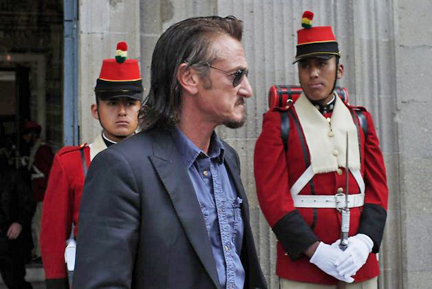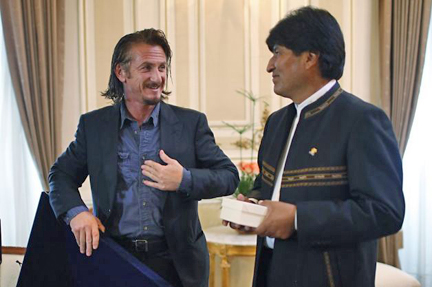
(above) Actor Sean Penn leaves Bolivia's presidential palace after meeting with President Evo Morales in La Paz on behalf of Jacob Ostreicher in October. Photo: Juan Karita, Associated Press / SF
Bolivia jolted by extortion scandal
December 10, 2012 - AP
La Paz, Bolivia -- It is an unlikely tale: Orthodox Jew from New York City comes to Bolivia to rescue a rice-growing venture, gets thrown in jail on suspicion of money laundering and, aided by actor Sean Penn, winds up triggering perhaps the biggest scandal yet for the country's president.
It all began 18 months ago when Jacob Ostreicher was arrested while trying to salvage a multimillion-dollar investment he was managing for Swiss partners. After Penn directly interceded on Ostreicher's behalf, it could now be reaching its end.
The Oscar-winning actor, who has forged friendships with President Evo Morales and other leftist Latin American leaders, presented Morales on Oct. 30 with evidence indicating the American was unjustly jailed and being fleeced.
(below) Penn says he was pleased with the investigation that followed his discussions with Morales. Photo: Juan Karita, Associated Press / SF

A high-powered corruption probe moved quickly, bringing eight arrests so far in what authorities described as a band of shakedown artists, extortionists and thieves led by the top legal adviser in the Interior Ministry and including two prosecutors.
"I took the evidence to the president and the president was highly responsive," Penn said by phone on Sunday from Haiti, for which he serves as a goodwill ambassador.
He would not discuss details of his meeting with Morales but praised the "excellent investigation" that ensued.
Ostreicher has a court hearing scheduled for Tuesday before a three-judge appeals panel that he hopes will order him released on the grounds that no credible evidence has been presented against him.
After a surprise Halloween visit from Penn, Ostreicher was immediately transferred from prison to a private medical clinic. A feisty, full-bearded man, the 54-year-old Ostreicher had been badly debilitated by a liquids-only hunger strike.
Less than a month later, the arrests began.
Investigators say the band had been preying for five years on captive targets with plunderable assets: people jailed for crimes such as drug trafficking and unlikely to make a public fuss. The alleged ringleader was Fernando Rivera, who had been managing Bolivia's most important prosecutions in the Interior Ministry since 2007. Among the eight people arrested was the former chief prosecutor in the eastern province of Santa Cruz, where Ostreicher and his partners grew their rice.
Investigators say Rivera frequently attended court hearings for his most important victims, including Ostreicher, to ensure they were not released.
In Ostreicher's case, the band allegedly sold 18,000 metric tons of rice worth several million dollars seized from Ostreicher's venture, along with confiscated heavy machinery and cattle. Ostreicher says the group demanded a $50,000 get-out-of-jail payment that he refused to pay, and intimidated a judge into reversing himself after initially ordering Ostreicher freed last year.
Bolivia's news media have wondered how Morales and his ministers could not have known about the ring.
"This case is affecting Morales' credibility," said analyst Jim Shultz of the Center for Democracy.